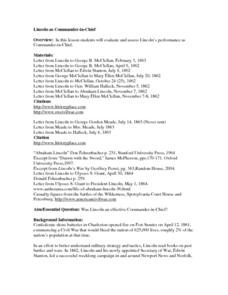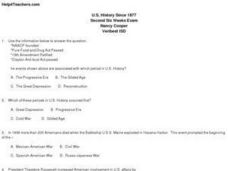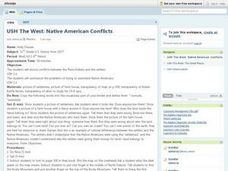Curated OER
U.S. Entry Into WWI
Students identify the reasons why the United States entered World War I. In this world history lesson, students are given a lecture on Woodrow Wilson and analyze documents (specifically, Woodrow Wilson's speeches). Students answer...
Curated OER
Abolitionists in U.S. History
Young scholars read and discuss excerpts from the writings of Henry David Thoreau, Frederick Douglass and Sarah Parker Redmond. They compare and contrast the views of the three abolitionists concentrating on the experiences and reasons...
Curated OER
U.S. History: Lincoln As Commander-In-Chief
Students examine and determine Abraham Lincoln's effectiveness as commander-in-chief during the Civil War. Role-playing as historians, they write essays evaluating Lincoln's performance after conducting Internet research from provided...
Curated OER
U.S. History: The Great Depression
Seventh graders examine the Great Depression and federal relief programs such as the Civilian Conservation Corps. Focusing on Texas, they assess the effects on poor farmers and discuss what they would do for a living had they lived in...
Curated OER
U.S. History: Virginia Assembly in America
Third graders discover the importance of the Virginia Assembly in English America as a governing body. After discussing the formation of the House of Burgesses, they elect their own representatives to make class decisions. In groups,...
Curated OER
Factors Contributing To the U.S. Dominance of the Pacific Northwest
Learners examine the painting Columbia by John Gast. They discuss the concept of Manifest Destiny and the role of different groups (miners, missionaries, fur trappers, farmers, etc.) in the Americanization of the West. In groups, they...
Curated OER
A Dictionary of Democracy
Middle schoolers create dictionary of terms for citizens of a democracy, using events and biographies from both their state's history and U.S. history.
Curated OER
The Gettysburg Address (1863): Defining the American Union
Learners explore the Gettysburg Address. In this U. S. history lesson, students examine Abraham Lincoln's speech and it's themes of freedom, equality, and emancipation.
Curated OER
How Did the Progressive Party affect American Society
Ninth graders explore the political views of the Progressive Party. In this U.S. History lesson, 9th graders read the "LaFollette Platform," then share their thoughts of the reading in a class discussion. To conclude the lesson, students...
Curated OER
The Education Element of the Harlem Renaissance and Its Impact on the New Negro
Learners investigate African American history by researching culture. In this Harlem Renaissance activity, students identify the teachings, music and art associated with African Americans in Harlem in the early 20th century. Learners...
Curated OER
History Telling
Tenth graders examine the different parts of history that make up people's lives. In this American History lesson, 10th graders explore how historians learn about events that happened in the past by looking at events that happened in...
Curated OER
Family History
Eighth graders examine immigration patterns. In this family history lesson, 8th graders investigate their own family histories and then compare and contrast immigration patterns of their class to national immigration patterns between...
Curated OER
History of Famous Women
Students discover the famous women who changed society by setting positive examples. In this equality instructional activity, students research a female person who had a positive effect on the world by fighting for her equal rights. ...
Curated OER
U.S. History Since 1877
Learners identify and analyze when the following occurred: the beginning of the NAACP, the enactment of the Pure Food and Drug Act, the ratification of the nineteenth Amendment, and the enactment of the Clayton Anti-trust Act. Students...
Curated OER
U.S. History: Native American Conflicts
Eleventh graders discuss the wars with the Plains Indians and the subsequent cultural difficulties of assimilation. Part of the lesson plan examines the clash of cultures and beliefs about land ownership. Prior to taking a quiz, 11th...
Curated OER
Novel Ideas: History of the American Novel
Explore the history of the American novel in the contexts of literature and US history. How does a novel or piece of writing from a particular time showcase the mood during that historical period? After conducting research and discussing...
Curated OER
The Jim Crow Era
Students examine how African-Americans were affected by the Great Depression. In this African-American history lesson, students conduct independent research on the social conditions of the time period using the suggested resources....
Curated OER
Japanese Music Study
Gagaku is music traditionally played in the Japanese imperial courts of long ago. Learners listen to this and other traditional Japanese music to gain an understanding of culture and music history. They work to identify Japanese...
Curated OER
March First Independence Movement
Learners study the pro-independence movement of 1919 in Korea. For this Korean history lesson, students investigate the implications of Japanese occupation of Korea and create posters that feature the essence of the Korean...
Curated OER
Comparing Time Periods in U.S. History: The Ashford Project
Fifth graders use a "fact book" comparing periods in American history then students create a picture to illustrate their assigned periods. # # students use their pictures and concept maps to write expository paragraphs about their...
TCI
Ain't I a Woman?
Learners discover the impact of women on civil rights in United States history by analyzing primary source clues to identify influential female figures.
Curated OER
The Branding of America (And Your State)
Students investigate about the origins of some major U.S. brands. They explore local products that stimulate the economy. Students create a map showing where those products originate. Students discover the products that their local area...
Curated OER
Put a Woman on a Stamp
Students nominate a woman to appear on a postage stamp. They explore the contributions of American women. Explain to students that the U.S. Postal Service issues 25 to 40 new commemorative stamps each year.
Constitutional Rights Foundation
Naturalized Citizens and the Presidency
Article II, Section 1 of the U.S. Constitution takes center stage in a lesson plan that asks class members to assume the role of state senators, debate a resolution to amend the U. S. Constitution to permit naturalized citizens to run...
Other popular searches
- U.s. History 1920s
- U.s. History Progressive Era
- U.s. History 1950's
- U.s. History Immigration
- U.s. History Colonial Period
- U.s. History Grades
- Women in u.s. History
- Current u.s. History
- U.s. History &Geography
- U.s. History + 1930
- U.s. History + Depression
- U.s. History 1920s Airplanes

























